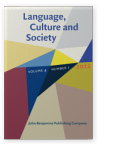Vol. 4:1 (2022) ► pp.68–91
“I think I belong over there”
Spatial, social, and linguistic (un)bordering by US citizens in Mexico
Experiences of belonging and unbelonging are constructed in multiple ways. Two young women share their stories of moving from north to south and their experiences of (un)belonging in the United States and Mexico. Analysis of the semi-structured interviews through interdisciplinary lenses highlights the contested nature of borders and the breaking down of pre-established categories. Beyond territorial borders, the experiences of these two US citizens of Mexican heritage reveal an ongoing negotiation of spatial, social and linguistic border spaces, blurring the distinctions between the two nationalities, multiple social groups, and the linguistic traditions to which they (choose to) belong. Different layers of identity and grounds for belonging intersect in the stories they tell. While family priorities and financial realities condition their choices and their mobility, the stories reveal agency and active (un)bordering on multiple scales, also exemplifying the potential of (un)bordering across academic disciplines.
Article outline
- 1.Introduction
- 2.The broader context: Mexican-US border making and border crossing
- 3.Conceptual framing: (In)definite borders and belonging across nations, social groups, and languages
- 3.1Territorial borders
- 3.2Social borders
- 3.3Linguistic borders
- 4.The interviews: Positionalities and methods
- 4.1The researchers: Two migrant women in the Netherlands
- 4.2The interviewees: Two migrant women in Mexico
- 4.3The data and analysis
- 5.Findings
- 5.1Territorial (un)bordering
- 5.2Social (un)bordering
- 5.3Linguistic (un)bordering
- 5.4(Un)bordering in the family
- 6.Conclusions
- Notes
-
References
